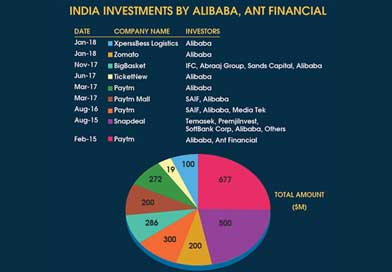Intention and attitude has to go parallel and that reflects in the deep strategy of Alibaba. The company has geared up to its Cloud team to disrupt AWS, Microsoft and Google in India too. Alibaba’s enterprise strategy is to mostly focus on its cloud business Aliyun and its top objective is to beat Amazon.
Alibaba provides online and mobile marketplaces in retail and wholesale trade, as well as cloud computing and other services. Alibaba’s investment arm (Ant Financial) made large investments in Snapdeal and Paytm; second is its investments into Big Basket, Zomato and XpressBees and third would be targeting the Indian start-up eco system. One has to deeply understand the strategy for India specific.
On the record, Alibaba along with its payments affiliate Ant Financial, owns a 40% stake in Paytm’s parent company One97 Communications. Bengaluru-based Big Basket raised $300 Mn Series E funding in a round led by Chinese conglomerate Alibaba in February this year. Alibaba is ready to invest $10 billion in the entertainment space in India.
The pre-defined vision of Alibaba’s investments into companies fall into three corners of the triangle which is popularly known as its Iron Triangle strategy (logistics, e-commerce and payments).
Alibaba’s iron triangle is a combination of e-commerce, logistics and finance. It all hinges on the massive amounts of commerce data that Alibaba generates. All this data is stored and processed on the Aliyun cloud. As per Harvard Business Review, Alibaba is not only a very successful disruptive company in China, but also brings to the table a completely different business model than Amazon’s.
For tech giants, India is the last major single growth market with hundreds of millions of potential consumers, first-time internet users, and a high growth smartphone market. Now Alibaba is expanding into the media industry, with revenues rising by triple percentage points year on year.
The best thing Jack Maa, co-founder and executive chairman of Alibaba, understood is how to win the heart of India, as globalisation is one of the key strategies for the company now. India is a very strategic market for Alibaba to look at. For a market like India, the key strategy is to help the local enterprises grow.
Jack Ma has come to India not just to invest, but to develop and groom. He has developed Alibaba into a world record holding company. The world has witnessed the most debated IPO of Alibaba in the United States (US), which turned out to be the world’s biggest public offering. Jack Maa believes in integrity and has frequent collaboration with people who share his vision. The decision of Jack Ma to choose to invest in Vijay Shekhar Sharma’s Paytm and his dream points to this fact. Jack Ma had a meeting with Vijay Shekhar Sharma that stretched from a pre-scheduled 20 minutes to a good 2 hours.
The crux of Paytm Founder’s vision is “to bring half a billion Indians to the mainstream economy and help millions of small businesses leverage this large m-commerce opportunity” and ecommerce sector with Paytm Mall in February this year. Alibaba at present owns majority stake in Paytm’s ecommerce entity.
Alibaba has also invested into LogiNext, a logistics management solutions provider and a market leader in the making. Its expertise lies not just in superior software capabilities, but also in its application of big data analytics. Again it fulfils the vision of Jack Ma, as he has mentioned before, “You need the right people with you, not the best people”.
Let’s understand from the ecommerce business – the total industry Gross Merchandise Volume (GMV) for ecommerce this year is going to be less than $20 Bn, whereas China is close to $ 1 Tn today. So it shows things are really moving forward, though it is still in its early days.
Alibaba along with Tencent and Baidu entered into the Indian start-up space as investors with 48 deals in 2014 and has invested $2.0 billion approx. in Indian start-ups. As per our data, Alibaba has made above 85 investments across geographies. It remains to be seen what Alibaba’s long-term strategy for India by using various platforms will be.
As per Daniel Zhang, CEO, Alibaba Group Holding, India holds immense potential and is a “very important” target for the ecommerce behemoth in its global strategy.
Cloud computing is beginning to transform the way enterprises buy and use technology resources, and will become even more prominent in the coming years. Amazon and Alibaba are two big ecommerce giants and are competing against each other to be the leader in the global ecommerce market, facing tough competition among themselves for expanding into new markets.
Alibaba has been building its strong presence in India , and sees its position as a key differentiator when it comes to competing with AWS, Microsoft and Google, with a strong strategy for disrupting a highly competitive cloud computing market by offering a broad range of cloud computing services, from basic infrastructure-as-a-service (IaaS) capabilities like elastic computing, storage and database solutions, to application services and advanced analytics capabilities like machine learning and IoT.



